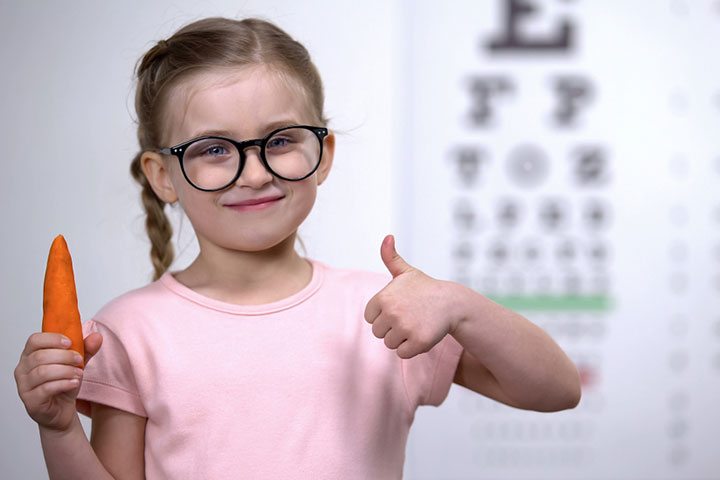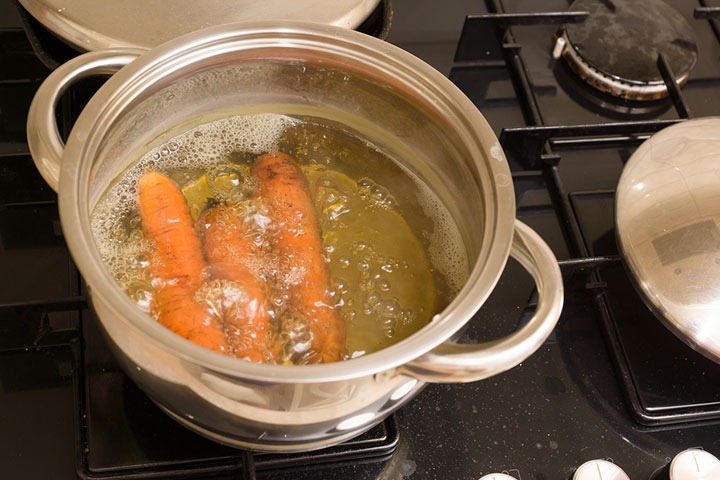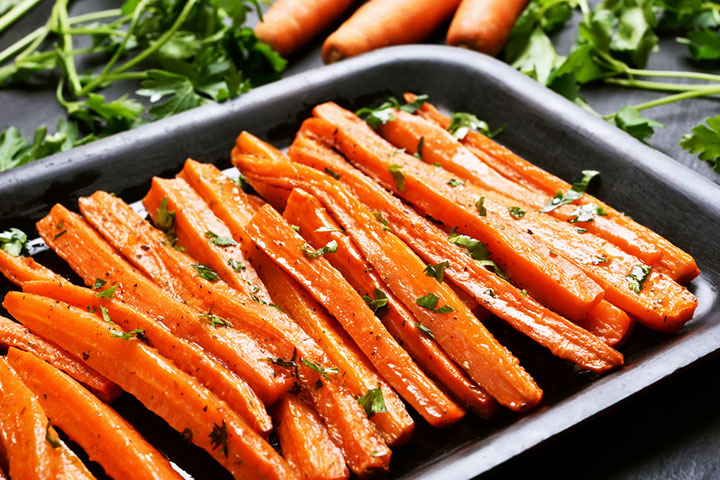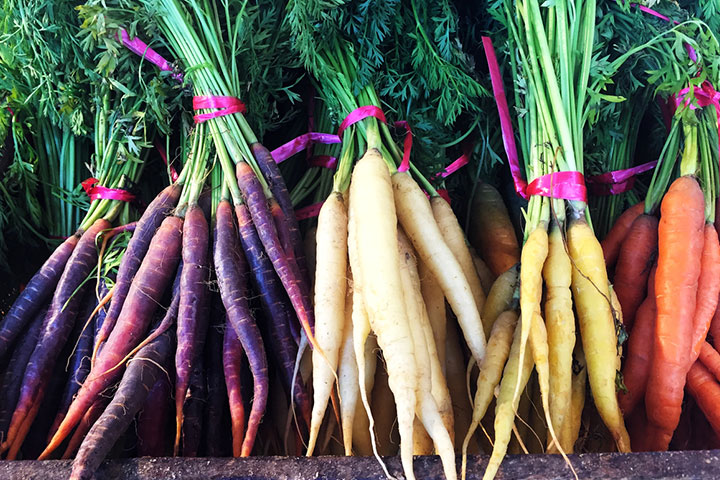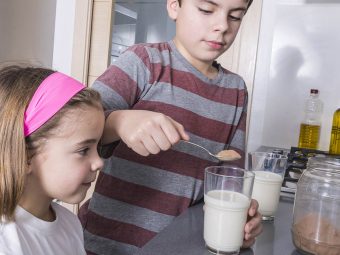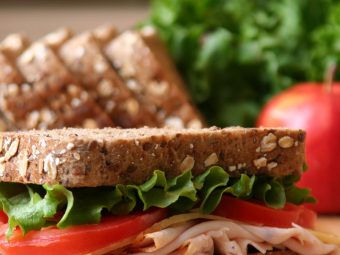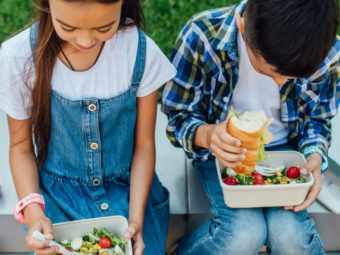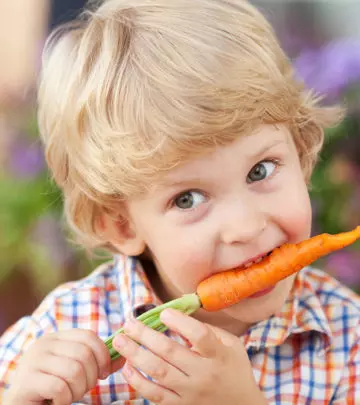
Image: ShutterStock
Carrot is a diverse vegetable that adds color, flavor, and texture to food. Besides, it gives nutrients and health-promoting compounds that can benefit health over time. Thus, carrots for kids are a healthy choice, and you can feed them in several ways. For instance, you can add carrots to various dishes to make delicious meals, such as carrot bread and carrot casserole.
Alternatively, you can serve raw carrot sticks with a dip as a healthy, quick snack to relish. Read on as we tell you more about carrots, their health benefits, the best ways to cook them for children, and some exciting, fun facts about this bright orange vegetable.
Carrot Nutrition Facts
Carrots are no superfoods but they are one of the most popular vegetables that are healthy and easy to grow. Here is why you should include carrots in your child’s daily diet.
- Carrot is rich in beta-carotene, an essential nutrient that enables healthy growth in children. Beta carotene plays a significant role in building immunity and also has anti-aging properties.
- Beta-carotene is converted into vitamin A in the body, which is essential for enabling night vision.
- Carrots are rich in thiaminiXA natural form of vitamin B1, required for many bodily processes, including cell growth and metabolism. , niaciniXA natural form of vitamin B3 employed in various processes such as energy metabolism, cell growth, and function. , and vitamin B6.
- Carrots have dietary fiber, which slows the absorption of sugars into the bloodstream.
- They are a source of manganese, and vitamins C and K. Fresh carrot roots have high content of vitamin C and provide 9% of RDA.
- Carrots are also rich in minerals like calcium, iron, potassium, copper, and phosphorus.
- Research by the University of Newcastle revealed that carrots also have high content of falcarinol, an antioxidant that can help fight certain types of cancers.
Health Benefits of Carrots
Here are several benefits of carrots for kids for which they should be made a part of your child’s healthy eating regimen.
1. Improves vision
Image: Shutterstock
Vitamin A is essential for good vision. The good news is that this vitamin is abundantly available in carrots. Carrots have beta-carotene that is converted into vitamin A in the liver cells. Eating carrots every day can improve eyesight and prevent the risk of eye-related disorders, such as night blindness.
 Did you know?
Did you know?2. Prevents macular degeneration
Eating carrots prevents the risk of macular degenerationiXAn eye disease that affects an individual’s central vision and may gradually lead to a loss of vision. in kids. Carrots supply a good amount of beta-carotene, which helps lower the risk of macular degeneration by 40%. Also, beta-carotene splits to form pro-vitamin A, which possesses vision-related antioxidant properties needed for good vision and sharp eyesight.
3. Healthy skin
Carrots have beta-carotene which is a pigment that gives the vegetable its color. Beta carotene also gives your skin a healthy glow, while vitamin A and the antioxidants in the vegetable protect your skin from sun damage. Vitamin A deficiency also results in brittle hair, nails, and dry skin. A healthy diet that includes carrots can also slow down aging, as beta-carotene helps in repairing skin cell damage due to metabolism.
4. Promotes digestion and prevents constipation
Carrots contain high amounts of dietary fiber and promote digestion. Also, fiber stimulates the secretion of gastric juices and ensures smooth bowel movements. So, eating carrots prevents constipation and other stomach disorders.
5. Cures diarrhea
Carrots help cure your kids’ diarrhea quickly and effectively. Drinking carrot soup or juice a few times every day helps compensate for loss of water.
6. Eliminates intestinal worms
Carrots also help eliminate intestinal worms that thrive in your angel’s stomach. Consuming carrot soup or mashed up carrot helps them cure stomach disturbances resulting due to intestinal worms.
7. Improves memory
Carrots are also known to play a significant role in cognitive development. They contain a compound called luteolin, which can prevent brain inflammation and gradual memory loss that comes with age.
8. Cleanses the body
One of the best things about carrots as a snack is that they are low in cholesterol. That is not all. Carrots help remove the bad cholesterol or fat from the liver, while maintaining the bile levels in the organ. Including carrots in your diet can help you cleanse the body of toxins. The dietary fiber in the vegetable helps in keeping the coloniXA tube-shaped organ of the large intestine that facilitates the absorption of essential nutrients and removal of digestive waste. clean and quickens the elimination of waste.
9. Keeps the teeth healthy
Image: IStock
Have you ever wondered why we eat raw carrot sticks after a meal? Carrots are natural abrasivesiXMaterials used to polish and impart smoothness to the surface of other things. that help in cleaning the teeth. They clear the plaque from the gums and the teeth, removing any bad odor created by the foods we eat. Calcium and other minerals that carrots have fight off germs and keep the teeth healthy and clean.
The bottom line is that carrot is a powerhouse of vitamins and minerals which will do your child a world of good. So make it a part of their diet and encourage them to eat it often.
Additionally, carrots have diverse long-term benefits too. They help in:
1. Preventing cancer:
The compound falcarinol, in combination with beta-carotene, can help avoid different types of cancers, including breast, throat, mouth, prostate, bladder, and intestine. Studies have proven that smokers or individuals exposed to tobacco, who eat carrots at least once or twice a week, have fewer chances of getting lung cancers (1).
2. Reducing the risk of heart disease:
Beta-carotene and alpha carotene act as anti-oxidants and help in managing blood pressure better. A diet rich in carotenoids helps fight heart diseases (2) . Also, carrots contribute to reducing the LDL cholesterol, which is not good for the heart.
3. Preventing stroke:
Carrots help in reducing the chances of a stroke. According to a Harvard University study, regular intake of vegetables, including carrots, can reduce the possibility of a stroke. A person who has at least eight servings of fruits and vegetables reduces his chance of stroke by 30%.
When you are picking carrots for kid, make sure you get her one that has no cuts, bruises, or soft spots. Peel and cut the carrot in half and let her munch on the pieces. If she doesn’t fancy it, you can juice the carrot up and make a smoothie out of it.
 Quick tip
Quick tipBest Ways to Cook Carrots for Kids
Most kids love carrots because they are tasty and slightly sweet. But like other veggies, carrots can get boring, especially if you give it to your child daily. Here are a few ideas on how to cook carrots, while retaining their nutrients, to make them appealing to children.
- Boiling is one way to cook a carrot. Use only a cup of water to boil 100g of carrots on low flame. That way, the water will evaporate, leaving the nutrients intact. Otherwise, the chances are that a good portion of the nutrients is drained with the water. Boil carrots only if you are going to use the water in the dish.
Image: IStock
- Steaming is a better option than boiling, as it hardly needs any water for cooking the carrots. Steamed carrots can be seasoned with cheese and served as a snack for children.
- Saute carrots in a pan if your children like it crispy. You can use half a teaspoon of cooking oil to cook the carrots this way. Add salt and garnish with a little parsley after you cook them. Sauteed carrots are an excellent option for dinner.
- Roasted carrots are as healthy as steamed carrots, except they are not soft and mushy. Roasting is a healthier alternative to frying carrots, as there is little use of cooking oil or fats.
- Another way to make carrots tasty and interesting is to flavor them. Boil or steam cook carrots first. Then saute them in butter, with sugar and orange juice sauce in a pan.
- Carrot juice is an excellent option for toddlers and young children who prefer liquids to solids. Juicing the carrot with veggies, such as kale, milk/yogurt, apple, and honey is a great way to create a delicious smoothie for your child.
- Baked carrots can be used with several other veggies, red and yellow bell peppers, and avocado to prepare vegetable snacks for children. Slice the carrots vertically, into thin strips, and place them on a baking sheet greased with olive oil. Bake at 400 degrees Fahrenheit for 20 minutes, tossing them in between. This way, you have fresh roasted carrots in less than half an hour.
Image: Shutterstock
- A healthier way to cook carrots is to boil or steam them whole. That will prevent loss of any nutrients when they are blanched.
Susan from New Jersey, who is a mother of a sweet daughter, Madeline, and a cooking enthusiast, shares her simple carrot chips recipe, “I fried carrots on Thanksgiving, before the turkey even went into our fryer, and left them out in a bowl for my guests to nibble on. They were pretty much devoured by kids and adults alike… I didn’t trust myself to use the mandolin for this job (slicing carrots lengthwise is just too close for my comfort). So I used a peeler and pressed down hard to get the thickest possible ribbons (i).” She dried the carrot ribbons on blotting paper, deep-fried them, and sprinkled salt on them.
Fun Carrot Facts For Kids
Is carrot a fruit or a vegetable? What gives carrot the bright orange color? Find out the answers and more from these interesting details all about carrots.
- Did you know that carrot is a root vegetable? You guessed it right. It grows underground! What we eat is the taproot of the carrot plant.
- Carrot gets its orange color because of its beta-carotene content. But did you know that carrots also come in purple, white, black, red, and yellow?
Image: IStock
- Carrots are made up of 88% water! They have 7% natural sugars, and the rest is protein, fiber, ash, and fat.
- Carrots are so rich in nutrients that one medium-sized carrot can cover your kid’s daily serving of vegetables!
- On an average, an American eats 10.6 pounds of fresh carrots every year.
- Did you know, people first grew carrots for medicinal purposes? In fact, the word ‘carrot’ first appeared in the Book of Herbs, back in 1538.
- Historical paintings and documents revealed that carrots were harvested even 5000 years before now.
- Apparently, carrot is the only vegetable that Santa’s reindeer do not eat.
- The British World War II slogan was “Carrots keep you healthy and help you see in blackout.”
- The biggest carrot that was ever grown was 19 feet long and weighed 19 pounds.
- The Portuguese make jam from carrots. Because of that, some argued that carrot was a fruit and not a vegetable.
- After potato, a carrot is the most popular vegetable in the world.
- The green tops of the vegetable are edible too, although not a lot of people know about it.
Frequently Asked Questions
1. Is one carrot a day enough for my child?
Yes. Depending on your child’s food preferences, you may serve them one raw carrot or incorporate carrots while cooking various meals. Carrot is one of those colorful foods that can easily add flavor, texture, and color to a dish. So give your child a carrot daily in different ways.
2. Can a three-year-old eat too many carrots?
About three whole tablespoons of healthy vegetables such as carrots per day could be safe for children (3). Also, eating more than ten carrots in a day for a continuous one week might put your child at risk of carotenemia (a skin condition that is caused due to increased beta carotene levels) (4).
3. When can children eat raw carrots?
Carrots are safe for children to consume when they turn two. However, don’t serve big pieces of carrots to them, as they can be a choking hazard. It is advised to increase the size of raw vegetables when they turn four (6).
4. Are baby carrots good for children?
Baby carrots have high levels of vitamin A and dietary fiber, which makes them a good snacking option for children (6). However, since carrots are a solid vegetable, don’t serve them to children under two years old without grating.
5. How many baby carrots are in a serving for children?
One serving corresponds to one cup of vegetables. One cup contains approximately 12 baby carrots (7).
Carrots for kids are colorful foods that are highly nutritious food. Their regular intake can help relieve digestive problems and improve skin, teeth, and eye health. Carrots also have the potential to prevent heart disorders and cancer. They are among the healthiest vegetables that may be eaten raw or cooked. Raw peeled carrots may be added to salads or blended into smoothies with other ingredients. You may also serve them baked, boiled, steamed, or sauteed. The carrots will do you nothing but good regardless of how you consume them.
Infographic: How To Cook Carrots For Children?
Carrots are nutritious, delicious, and packed with a variety of bioactive substances good for your health. They can be included in a variety of ways for your children. The infographic below offers some wholesome methods for preparing and including carrots in your kids’ diets. Illustration: Momjunction Design Team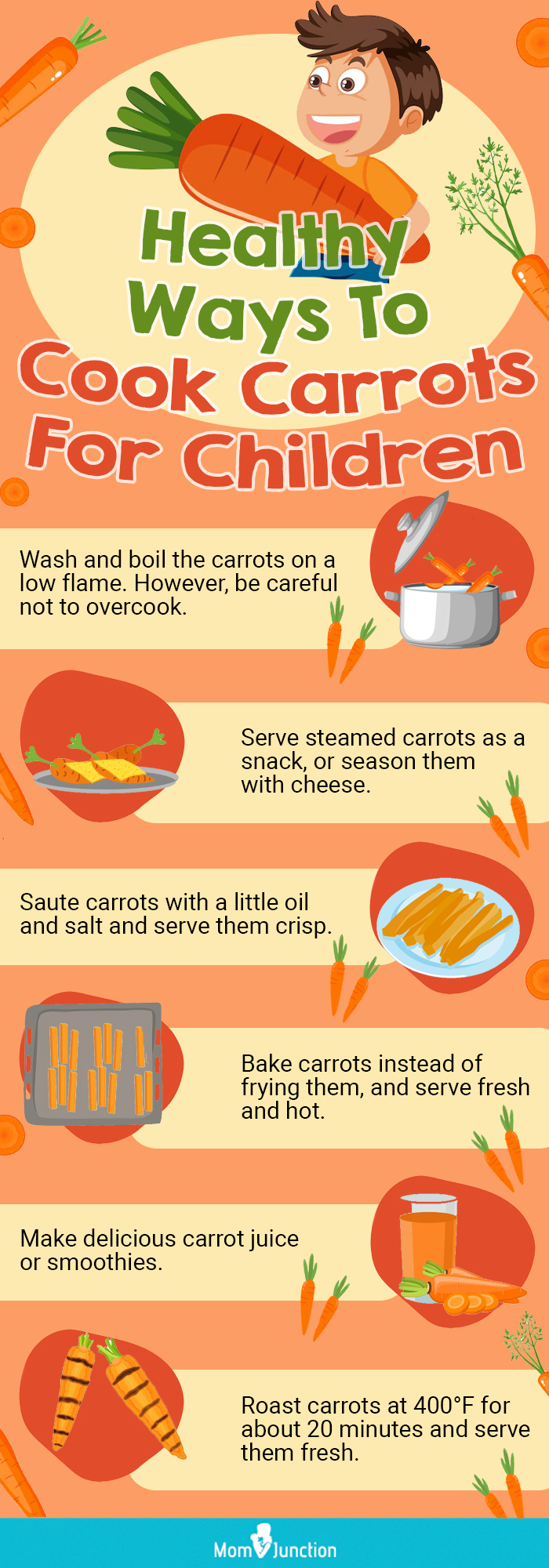
Key Pointers
- Carrot is a root vegetable that gets its color from an orange-colored pigment named beta-carotene.
- Carrots are rich in dietary fiber, vitamins, and minerals, making them nutritious meal options for kids.
- Consumption of carrots can aid in improving vision, memory, digestion, skin, and dental health.
- Additionally, carrots can also help prevent macular degeneration, diarrhea, and eliminate intestinal worms.
- Scientific studies suggest that long-term consumption of carrots can help prevent cancer, stroke, and heart diseases.
- Carrots can be baked, boiled, juiced, roasted, steamed, or sautéed before feeding them to children.
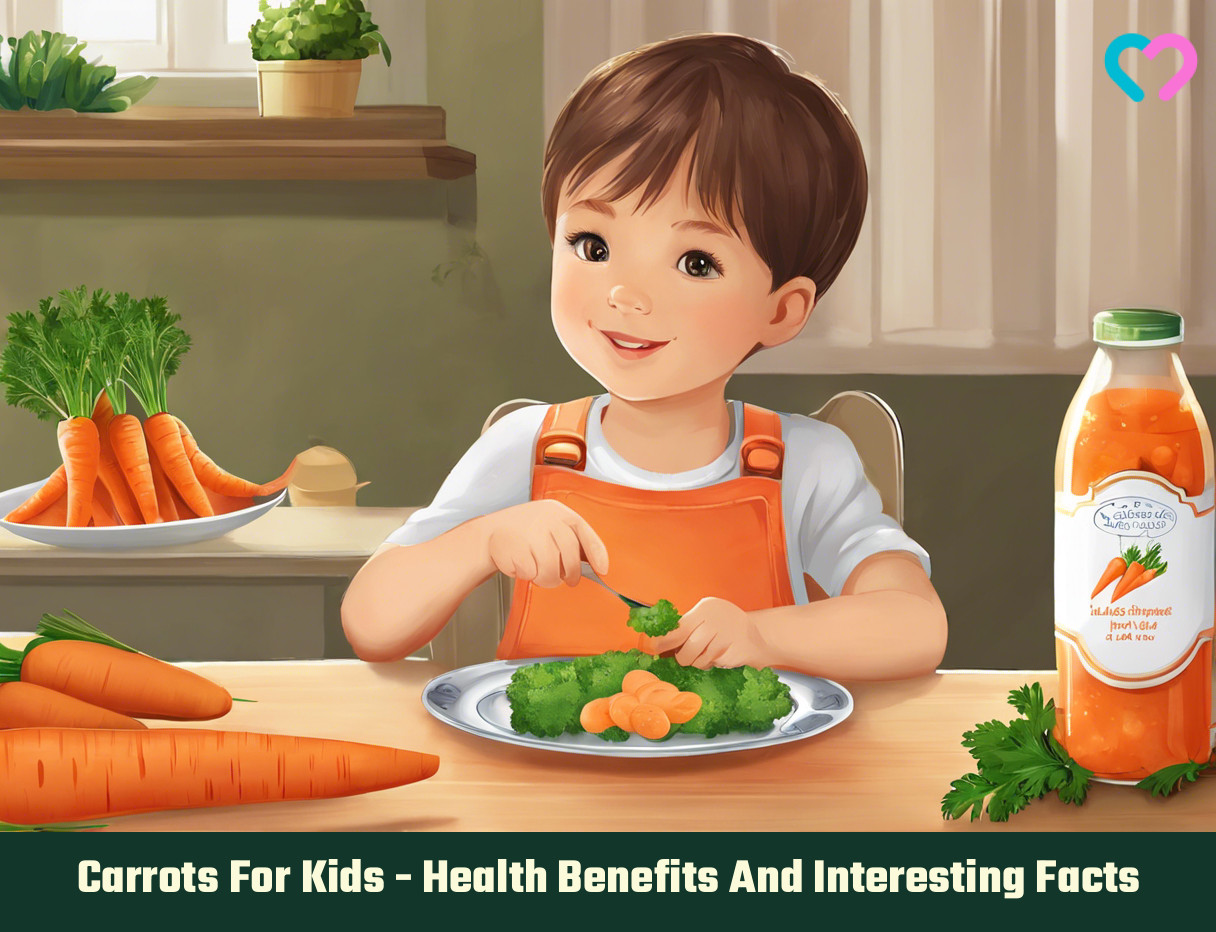
Image: Stable Diffusion/MomJunction Design Team
Personal Experience: Source
MomJunction articles include first-hand experiences to provide you with better insights through real-life narratives. Here are the sources of personal accounts referenced in this article.
i. Carrot chips.https://bloatalrecall.blogspot.com/2012/12/carrot-chips.html
References
- P Pisani et al.; (1986); Carrots, green vegetables and lung cancer: a case-control study.
https://pubmed.ncbi.nlm.nih.gov/3818153/ - α-Carotene, β-Carotene, β-Cryptoxanthin, Lycopene, Lutein, and Zeaxanthin.
https://lpi.oregonstate.edu/mic/dietary-factors/phytochemicals/carotenoids - 5 A Day portion sizes.
https://www.nhs.uk/live-well/eat-well/5-a-day/portion-sizes/ - Can Eating Too Many Carrots Turn Your Skin Orange?
https://health.clevelandclinic.org/can-eating-too-many-carrots-turn-your-skin-orange/#:~:text=%E2%80%9CYou%20would%20need%20to%20be - Vitamin A and Carotenoids.
https://ods.od.nih.gov/factsheets/VitaminA-HealthProfessional/ - Is It Safe For Young Children To Eat Raw Carrots?
https://www.southernearlychildhood.org/what-age-kids-can-eat-raw-carrots/ - What Counts as a Cup?
https://santaana-nsn.gov/wp-content/uploads/2019/09/HealthyGatheringsDailyVegetableRecipes.pdf





